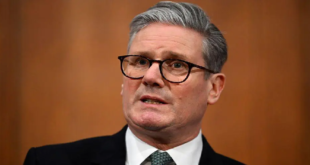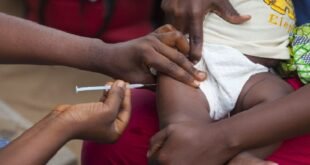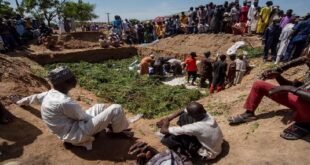30-11-2020
Bureau Report + Agencies
 CANBERRA/ MELBOURNE/ BEIJING: Australian Prime Minister Scott Morrison said he was seeking an apology from China after a diplomat in Beijing tweeted an image purporting to show an Australian soldier holding a knife to the throat of an Afghan child.
CANBERRA/ MELBOURNE/ BEIJING: Australian Prime Minister Scott Morrison said he was seeking an apology from China after a diplomat in Beijing tweeted an image purporting to show an Australian soldier holding a knife to the throat of an Afghan child.
The tweet, posted by Chinese Foreign Ministry spokesman Zhao Lijian, was “repugnant,” Morrison told reporters in Canberra on Monday. The Australian premier said the image was doctored and called for Twitter to remove it.
“The Chinese government should be totally ashamed of this post,” Morrison said. The tweet will diminish China’s global reputation, he said.
Morrison’s call for an apology ramps up tensions between the nations, following China’s decision to impose crippling  anti-dumping duties on its wine over the weekend. Diplomatic ties have plummeted this year after Australia called for independent investigators to be allowed into Wuhan to probe the origin of the pandemic, leading to a series of trade reprisals.
anti-dumping duties on its wine over the weekend. Diplomatic ties have plummeted this year after Australia called for independent investigators to be allowed into Wuhan to probe the origin of the pandemic, leading to a series of trade reprisals.
Zhao’s boss later dismissed Morrison’s demand for apology, asking at a briefing in Beijing whether the Australian leader “lacks a sense of right and wrong.” Foreign Ministry spokeswoman Hua Chunying told reporters that it was the Australian side that should apologize to Afghanistan and denied any link between the tweet to the broader dispute between the two sides.
“That is totally unrelated with other issues between China and Australia — it’s a matter of principle,” Hua said.  “There are other issues between China and Australia, but the root cause for that is that Australia goes against basic norms of international relations and took wrong measures on issues bearing on China’s core interests.”
“There are other issues between China and Australia, but the root cause for that is that Australia goes against basic norms of international relations and took wrong measures on issues bearing on China’s core interests.”
Bottom of Form
Australian Special Forces soldiers serving in Afghanistan were allegedly involved in 39 unlawful killings of prisoners, farmers and other civilians, a government-commissioned report found earlier this month. Following a four-year inquiry, the report found there was credible information that 25 personnel may have been complicit and 36 matters should be referred to police for criminal investigation.
 General Angus Campbell, the head of the Australian Defense Force, said he “sincerely and unreservedly” apologized to the Afghan people when he announced the results of the probe.
General Angus Campbell, the head of the Australian Defense Force, said he “sincerely and unreservedly” apologized to the Afghan people when he announced the results of the probe.
Zhao, who has more than 175,000 followers on the social network banned in China, has a reputation for stirring diplomatic disputes with Twitter posts. In March, he floated a conspiracy theory that the U.S. Army may have had a role in spreading the coronavirus in China, escalating a blame game in which President Donald Trump started referring to the disease as the “Chinese virus.”
In his latest tweet, Zhao said he was “shocked by murder of Afghan civilians & prisoners” by Australian soldiers. “We strongly condemn such acts, & call for holding them accountable,” he said.
 The tweet includes an image that purports to show a soldier standing on the Australian flag and holding a bloody knife to the throat of a child clutching a lamb. The child’s face is covered with a blue cloth. The text beneath the photo reads: “Don’t be afraid, we are coming to bring you peace!”
The tweet includes an image that purports to show a soldier standing on the Australian flag and holding a bloody knife to the throat of a child clutching a lamb. The child’s face is covered with a blue cloth. The text beneath the photo reads: “Don’t be afraid, we are coming to bring you peace!”
Zhao is closely associated with “Wolf Warrior” diplomacy, a more confrontational approach named after a nationalistic Chinese action film series of the same name. The Wolf Warriors have come to the fore amid debates about China’s early efforts to contain the coronavirus and policies to suppress human rights in places like Hong Kong and the predominately Muslim region of Xinjiang.
Australia is the world’s most China-dependent developed economy and finalized a free-trade agreement with Beijing  in 2015. Relations have been fraught since 2018, when Canberra barred Huawei Technologies Co. from building its 5G network.
in 2015. Relations have been fraught since 2018, when Canberra barred Huawei Technologies Co. from building its 5G network.
Ties went into free-fall earlier this year after Canberra’s call for the virus probe, a move that bruised China’s pride and unleashed a torrent of criticism that Australia is a puppet of the U.S. China has accused Australia of souring bilateral ties by interfering in its internal affairs, including criticism of Hong Kong’s national security legislation and the internment of Uighurs, a Muslim ethnic group living in Xinjiang.
“There are undoubtedly tensions that exist between China and Australia, but this is not how you deal with them,” Morrison said of the tweet.
 Pressmediaofindia
Pressmediaofindia




